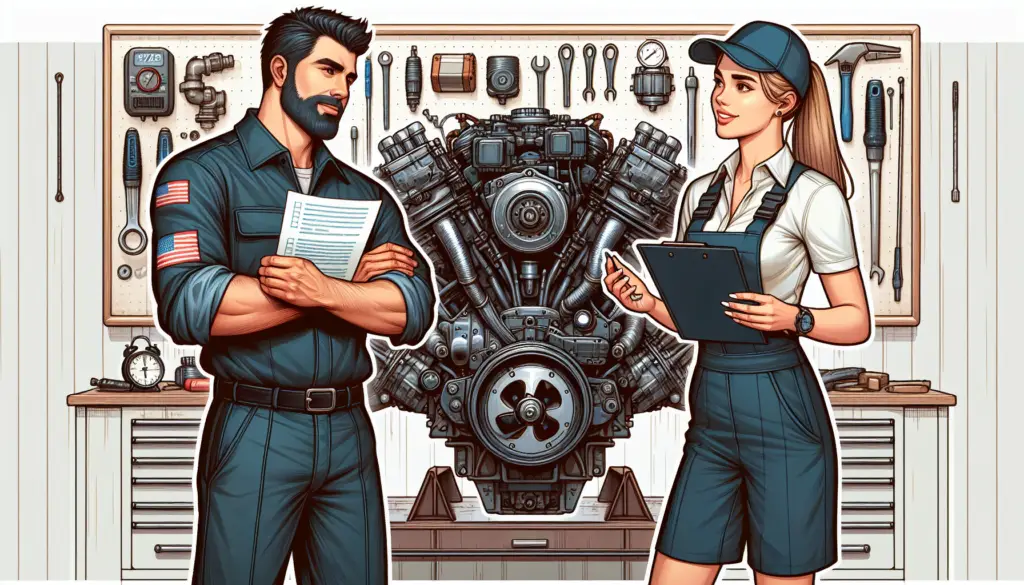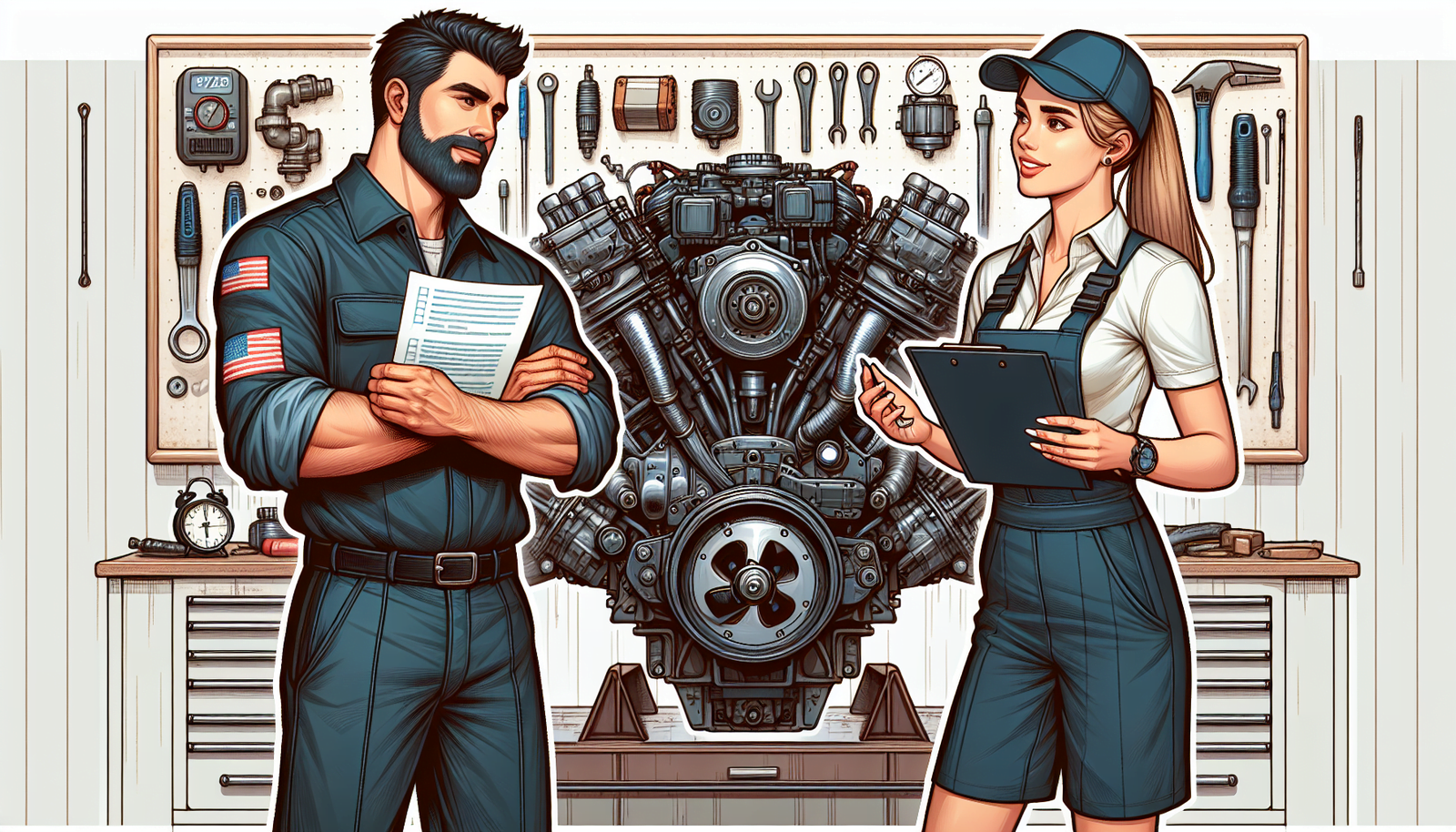Navigating the path to finding a trustworthy mechanic for your boat engine can sometimes feel as complicated as plotting a course through stormy seas. The Ultimate Guide to Finding a Reliable Mechanic for Your Boat Engine demystifies this journey, offering you clear directions and a solid anchor in your quest for dependable and quality service. Along with expert advice, you’ll discover essential tips, crucial considerations and warning signs, ensuring you’re equipped to find a mechanic you can depend on to keep your vessel running smoothly and your days on the water carefree. Ease your worries, as life’s too short to spend it stressing over boat engine troubles!

Understanding Your Boat Engine
Before diving into the search for a credible marine mechanic, it’s essential to have a basic understanding of your boat engine. You’re not expected to be an expert, but grasping the ins and outs can be helpful.
Knowing the common types of boat engines
Similar to cars, boats are powered by various types of engines. The most common types include outboard, inboard, stern drive, and jet propulsion. Each engine type has its unique characteristics, performance specs, and maintenance requirements. Knowing what type of engine your boat has will help when discussing any issues with a mechanic.
Recognizing your engine’s make and model
Just like identifying your boat engine type, it’s also crucial to recognize your engine’s make and model. This information can come in handy when seeking specific spare parts or when you need to discuss certain technical specifications with your mechanic. The make and model of your engine are typically found on an identification plate or decal directly on the engine.
Learning basic marine engine maintenance and repair skills
Some basic marine engine maintenance and repair skills can prove invaluable. From regular oil changes to periodic filter replacements, these prevention methods can save you from significant repair costs in the long run. They also place you in a better position to explain any unusual engine behaviors to your mechanic accurately.
Recognizing Signs of Engine Trouble
Part of understanding your boat engine includes recognizing when something might be wrong. Early detection can often mean the difference between an easy fix and a costly repair.
Detecting changes in performance and fuel efficiency
One of the first signs of engine trouble might be changes in how your boat performs or its fuel efficiency. If the engine isn’t giving enough power, or if it seems to be guzzling more fuel than usual, there’s a high chance there’s an issue.
Identifying unfamiliar engine noises
Your experience with your boat means you’re familiar with how the engine sounds during operation. Any unfamiliar noises could be an indication that something is amiss. From knocks and pings to various rattles, an understanding of what each sound indicates can save you from a disastrous engine breakdown.
Spotting physical damage and leaks
Physical damage like cracks or leaks in your boat engine are bad news. If left unchecked, they can result in substantial engine damage and could compromise your safety on the water.
Doing Initial Research on Marine Mechanics
Once you’ve uncovered engine issues, you’ll want to find a marine mechanic to assist with repairs. Knowing where to start your search is the first step.
Searching for local marine mechanics
Local marine mechanics or repair shops should be your first port of call. Proximity means quicker service and ease of accessibility, especially if your boat isn’t in a seaworthy condition.
Checking online reviews and ratings
Online reviews and ratings offer valuable insights into the quality of service provided by prospective mechanics. Pay attention to consistent comments or complaints. While every mechanic will have their share of bad reviews, there’s cause for concern if they outweigh the positive ones.
Asking for recommendations from fellow boaters
There’s nothing more reassuring than a recommendation from a trusted fellow boater who’s had first-hand experience with a mechanic. Let your fellow boaters know what you’re looking for in a mechanic, and they might just have the perfect recommendation for you.
Verifying Mechanic’s Qualification and Experience
It’s essential to verify your mechanic’s qualifications and experience to ensure they can capably handle the task at hand.
Asking about their training and certification
Relevant training and certification give assurance that the mechanic has the necessary knowledge and skills. Having credentials from recognized training institutions or certification bodies is a good sign.
Finding out how long they have been working on boat engines
Experience often equates with skill level, so it’ll help to ask about how long they’ve been working on boat engines. Someone who’s been in the business for years will have probably encountered and fixed a variety of engine issues.
Checking if they specialize in your engine’s make and model
Some mechanics specialize in specific makes and models. It would therefore be beneficial if your chosen mechanic specializes in your engine’s make and model.

Getting Estimates and Comparing Prices
Like any other service, prices for boat engine repair can vary greatly.
Requesting for a detailed quote
A detailed quote outlines the cost of labor, parts, and any additional fees. Always request one to avoid any surprise charges down the line.
Comparing rates from several mechanics
Get estimates from various mechanics to compare. The cheapest may not always be the best, and the most expensive doesn’t guarantee the best service. Balance cost with the quality of service.
Understanding what is included in the price
Sometimes, the initial quote might not cover extra services that your boat may need. Ensure you know what each quote covers for accurate comparison.
Ensuring the Mechanic Provides Warranty
A warranty provides coverage for certain aspects of the repair work in case issues arise after the job is done.
Asking about the warranty policy
Enquire about the mechanic’s warranty policy. A good warranty provides added assurance of the mechanic’s confidence in their workmanship.
Understanding terms and conditions of the warranty
Demystify the warranty’s fine print. Make sure you understand what’s covered, the duration of the coverage, and what voids the warranty.
Confirming whether labor and parts are both covered under the warranty
Ideally, both labor and parts should be included in the warranty. This means if something goes wrong within the warranty period, you won’t have to pay an extra cent.
Evaluating Communication and Customer Service
Good communication and customer service can significantly affect your experience with a mechanic.
Rating mechanic’s willingness to answer questions
A good mechanic is willing to answer your questions, no matter how simple or complex. They realize that transparency fosters confidence.
Assessing their availability and responsiveness
Assess how quickly the mechanic responds to your inquiries or how available they are when you need them. This could reveal a lot about their regard for customer service.
Checking their transparency and honesty
Transparency and honesty are crucial in any business dealing. Ensure your mechanic communicates all aspects of the repair process and is honest about the cost, time, and outcome of the repair.
Visiting The Mechanic Shop
Your prospective mechanic’s shop can tell you a lot about their operations.
Checking the tidiness and organization of the shop
A well-organized and tidy shop is often an indication of a mechanic’s meticulousness and attention to detail. It shows they take their work seriously.
Observing other boats being worked on
Observing the other boats in the shop can give insights into the scope of work the mechanic handles. It can also be a chance to gauge customer satisfaction.
Noting the quality of parts and tools used
Good quality parts and state-of-the-art tools often equate with high-quality work. A reliable mechanic invests in quality tools and supplies.
Asking About Marine Mechanics’ Insurance
A responsible mechanic should also have the right insurance coverage.
Ensuring the mechanic has proper insurance
Ask for proof of liability insurance. This protects you from any liabilities in case an accident, damage, or injury occurs during service or repair.
Understanding what their insurance covers
Different policies cover different risks. It’s important to understand what the mechanic’s insurance covers to know what is protected.
Checking if your boat is protected while in their care
Your boat should be covered by the mechanic’s insurance while under their care. This will give you peace of mind, knowing that any damage to your boat will be covered.
Maintaining a Good Relationship with Your Mechanic
Your relationship with your mechanic can strongly influence the level of service you receive.
Respecting the mechanic’s expertise and time
Show respect for your mechanic’s expertise and time. Recognize that they have other clients and boats to work on besides yours.
Communicating your concerns and expectations clearly
Effective communication fosters understanding. Detail your concerns and expectations clearly so the mechanic knows what you want.
Showing appreciation for good service
Express your gratitude for good services rendered. A simple thank you can work wonders in fostering a good relationship.
In conclusion, finding a reliable boat mechanic can seem daunting, but with the right approach and knowledge, it doesn’t have to be. Understanding your engine, recognizing signs of engine trouble, and doing proper research can set you in the right direction. It pays to vet your mechanic thoroughly and maintain a good relationship with them. Happy boating!

